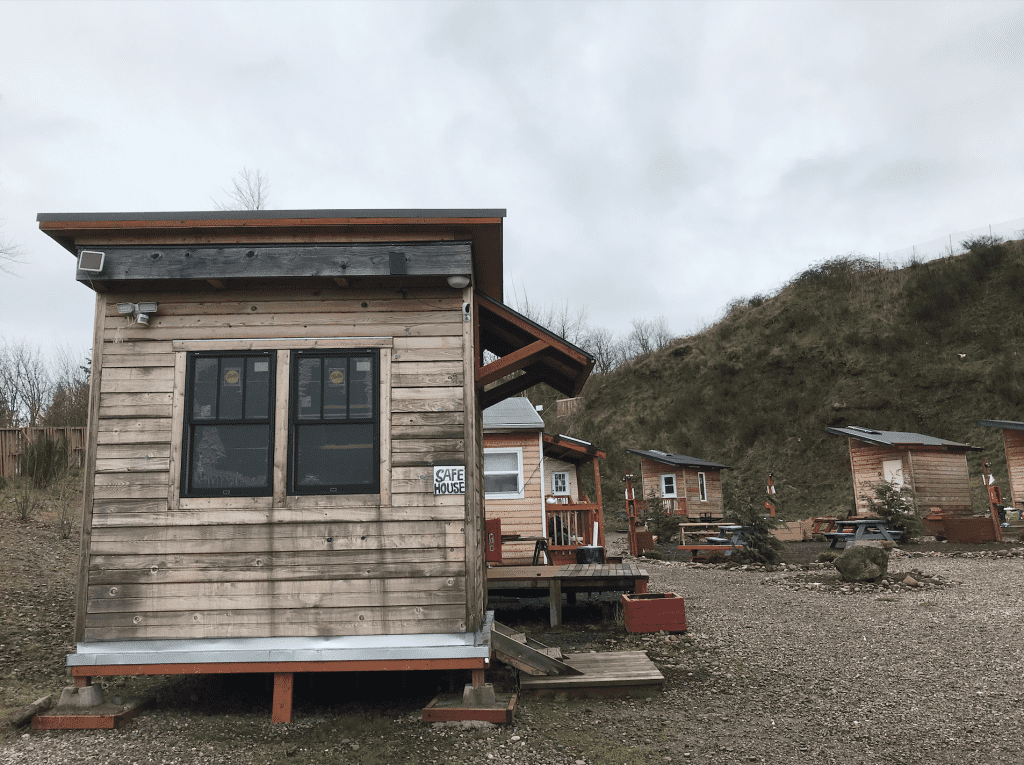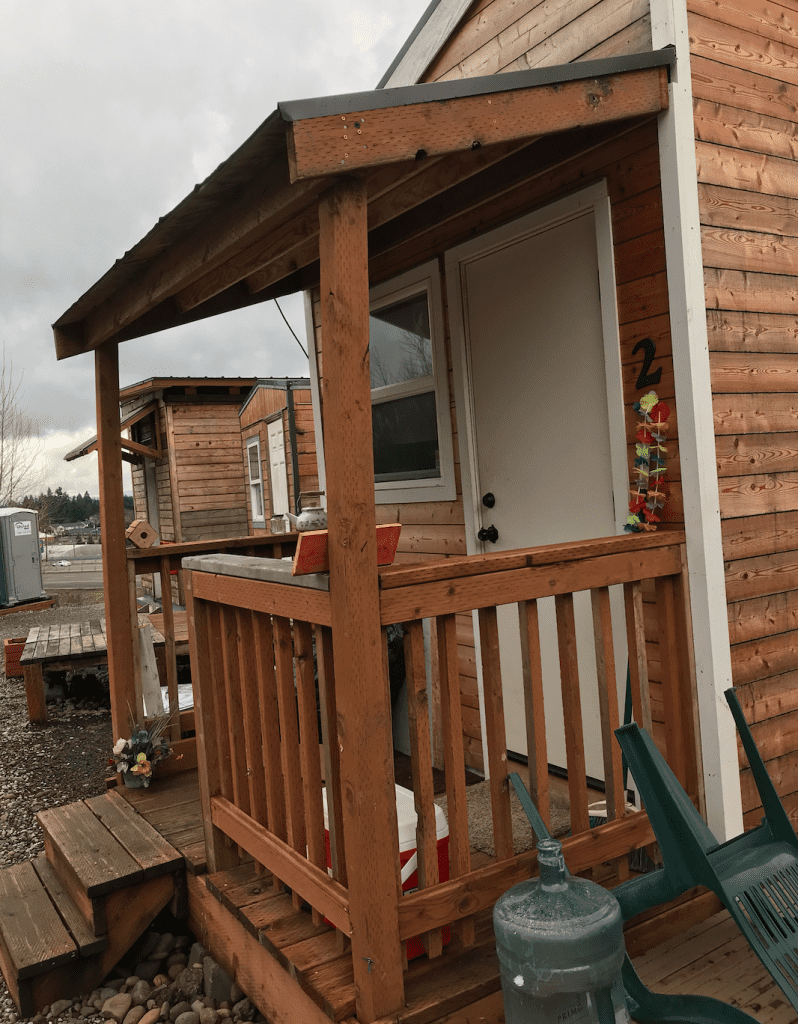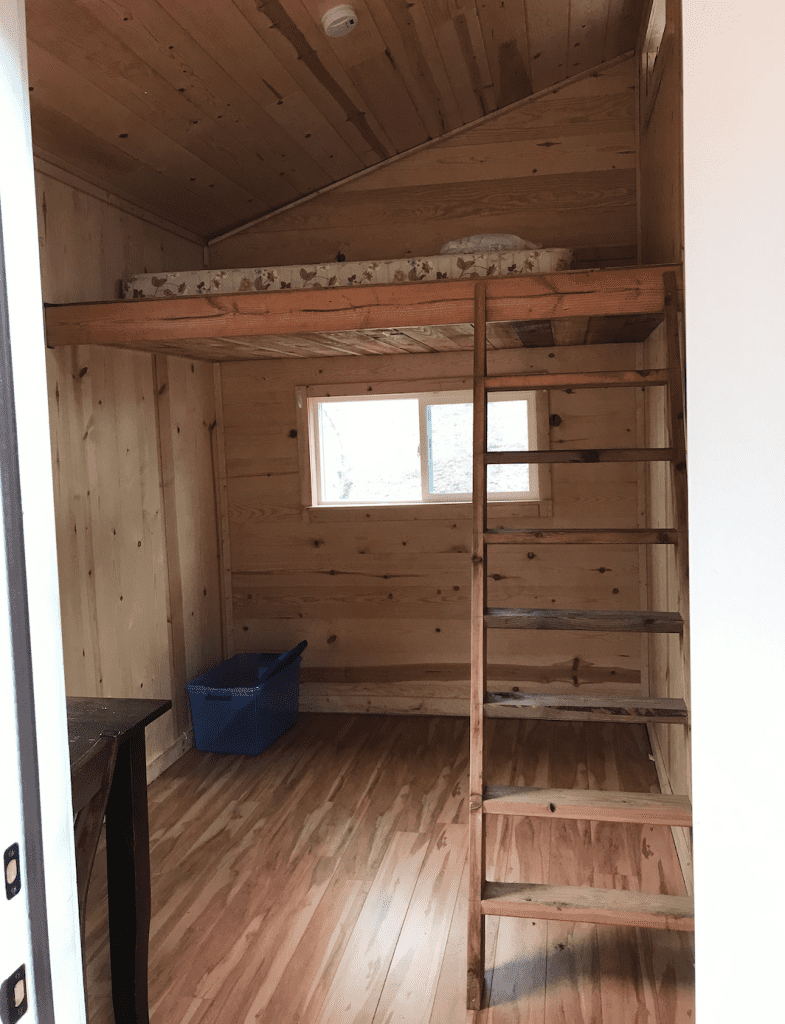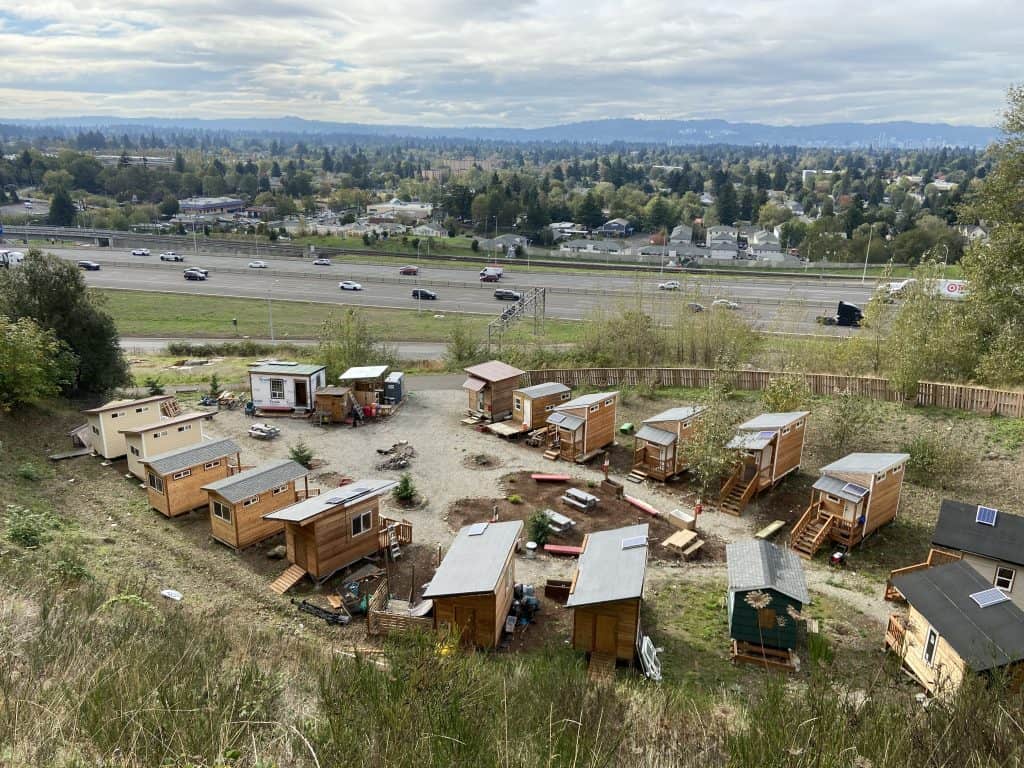Brittany ran away from home when she was eight years old to escape an abusive situation and has lived without a permanent home in Portland, Oregon for much of the time since. During these years, she resided under bridges, in yurts in the forest, in a self-governed encampment for people experiencing homelessness and even in a treehouse before landing in a community called Agape Village.
After just four months of living at Agape, Brittany, now 36 years old, transitioned into her own two-bedroom apartment.
“Agape Village gave me a safe space to just be me,” she says. “It showed me that I needed to really get a hold of my life. I had been in the wind a long time.”
Agape Village, located on the grounds of the city’s Central Nazarene Church, consists of 13 simple wooden huts. Sarah Chapman, outreach coordinator at Agape, calls them sleeping pods, but they are more like tiny homes — only without electricity or plumbing. “It’s rustic,” says Chapman. “A step up from camping, but definitely not like living indoors.” But to the people who live there, it is the community and the stability that are life-changing.

Chapman refers to Agape Village as a “transitional housing village” designed to bridge the gap between homelessness and permanent housing. Typically, transitional housing consists of a conventional house or apartment and is accompanied by intensive case management and other services for addiction and mental health issues. These days, though, the term has broadened to include low-cost, low-barrier-to-entry shelters such as sanctioned campgrounds or certain tiny-house villages. The people who live in them say having a roof over their heads has allowed them to address the challenges that have kept them chronically homeless in the past.
Tiny homes, transformational community
Living on the streets or in unsanctioned campgrounds means risking having your belongings stolen or or confiscated by city officials who routinely sweep through to “clean up” such encampments. And though homeless shelters are warm and mostly safe from crime, they have their own downsides: a lack of privacy, risk of infection and strict limitations on belongings.
Agape Village combines the sense of autonomy and community some seek out in tent cities with the basic protections — from crime, weather and police harassment — of a conventional shelter. In a sense, it’s a cheap and nimble version of Housing First, the concept that once a person’s basic shelter needs are met, they can get on top of other aspects of their life. (Although in Housing First, there are no prerequisites for sobriety, as there are at Agape.)
“I can leave my door open, take off, and then come back and everything is still the same,” says Dave Bradley, who has lived at Agape since it opened in December 2019. “Nothing’s gone. Nothing’s missing.” Bradley, a 50-something man dressed in a leather jacket studded with metal, makes bicycles and mini-choppers out of scavenged used parts. Prior to finding Agape, he lived on the streets for 12 years. Often, when he’d return to his campsite, his bikes would be missing. At Agape, he’s built a workshop next to his hut — where he lives with his chihuahua, Mindy — so he can build and repair bikes to his heart’s content.

Bradley and others say the community support at Agape makes the houseless life livable. Wendie Polarski is currently the only woman at Agape. For eight years, she lived along the Springwater Corridor Trail. Most of the time she didn’t even have a tent — just a bedroll and two shopping carts. Polarski says what she likes most about Agape is the moral support. “Being here… frees me.” she says. “They’re just very supportive and they help me take steps forward. The folks here become a family. We are like brothers and sisters and we kick each other in the behind when we need it. We have each other’s back.”
Though there haven’t been any studies about Agape Village’s impact in particular, there is ample research to show that stable housing in a functional community is key to people’s wellness. According to the American Hospital Association, housing instability can lead to detrimental health outcomes, from cardiovascular disease to chronic issues like diabetes. Studies have found that young people in unstable housing experience poorer cognitive development and are more apt to be anxious, aggressive or socially withdrawn.
Getting people into stable housing as quickly as possible is a big part of solving these problems. The issue is, it requires sufficient affordable housing inventory, something Portland and many other West Coast cities lack. That’s where smaller, cheaper shelters like Agape Village can help fill the gap.
Structured living
“Our pastor and our church were looking to see how we could live out the greatest commandment: love God and love our neighbors,” Chapman says. “When we looked to see who our neighbors were, they were in tents around us, camping nearby.”

Central Nazarene sits on 11 acres near the intersection of Powell Boulevard and the I-205 Freeway. During the bitter 2016/2017 winter, the church ran a warming shelter in collaboration with Clackamas County. Pastor Matt Huff learned about the village concept via a Portland-based nonprofit called the Village Coalition, and was able to gain support for Agape Village from Central Nazarene’s board. The pods were designed by Melissa Mulder-Wright, a student at Portland State University’s Center for Public Interest Design, and built by Cascadia Clusters as well as volunteers from Central Nazarene’s congregation and other church groups around the country.
Each villager is given a zero-degree sleeping bag, a Rubbermaid tote where they can store their food and a cooler to put on the front porch. Food is delivered every Monday, donated by the Portland Open Bible Community Pantry. There are three portable toilets, a shower with hot water and an outdoor kitchen. Pastor Huff has applied for a grant that would cover the cost of wiring the tiny homes for electricity and adding plumbing, as well.
Getting a spot at Agape Village requires a four-page application, an in-person interview and a basic background check. (A felony record isn’t a dealbreaker, but those with convictions for violent or child sex crimes are denied admittance.) The other prerequisite — which can be a challenge for some — is no alcohol or drug use. (The exception is cannabis, which is legal in Oregon. Agape allows each villager to have one ounce on their person.) Violators are suspended from the village for 48 hours; second offenders are expelled permanently. There are other basic rules — no disruptive or violent behavior — and residents are expected to contribute to the operation of the village. In addition to some landscaping and cleaning, each villager is expected to do one “night watch” shift per week, standing sentry at the entrance to the camp to watch for fires or intruders.
There’s no time limit to how long someone can stay at Agape Village, but villagers are required to make goals and work towards achieving them. Every month, Chapman meets with them one-on-one to check on their progress. “What do we need to work on next?” she asks. “ID and a doctor’s appointment? Finding a job?”
This guidance aims to help residents ultimately move into permanent housing. In just the two months that Polarski has been at Agape Village, she’s acquired her birth certificate and other crucial documents, and used the church’s computer for research and for video appointments with her doctors.

Kevin Pemberton, another recent arrival, has plans to build a beehive and hopes that the hosts of Garden Time, a local gardening TV show, will do a segment on Agape Village’s beehives and landscaping. “If I could get Sarah [Chapman] to be the spokeslady and get the Eagle Scouts out here and make it look good on camera…” he muses.
Covid-19 has slowed down admissions at Agape. Currently, the church is admitting only two new people every two weeks to prevent the spread of the virus. “The process isn’t quick,” Chapman says, “but it’s worth it.”
Brittany, who lived at Agape for four months with her 180-pound St. Bernard-Akita mix, Carmel, loved the structure the village gave her. Sober for 15 years, she didn’t have a problem with the no-drug, no-alcohol policy, but she knows that can be tough for others. “It really depends on where you are in life,” she says. “If you are not self-motivated, Agape Village is not for you.” She had just gotten a job as a caregiver when she arrived at Agape, and used her time living there to get on top of her finances. “I had never budgeted before,” Brittany says. Now she’s living alone in a two-bedroom apartment in Southwest Portland and is hoping to soon gain custody of her 15-year-old daughter.
She credits Agape Village with helping her make the transition to living on her own in an apartment where she can be fully self-sufficient. “I love what they are trying to do,” she says. “They are trying to give sanctuary to people who have never had it. They have structure in place to do that successfully. I love that they are trying hard to save the people who can be saved.”









